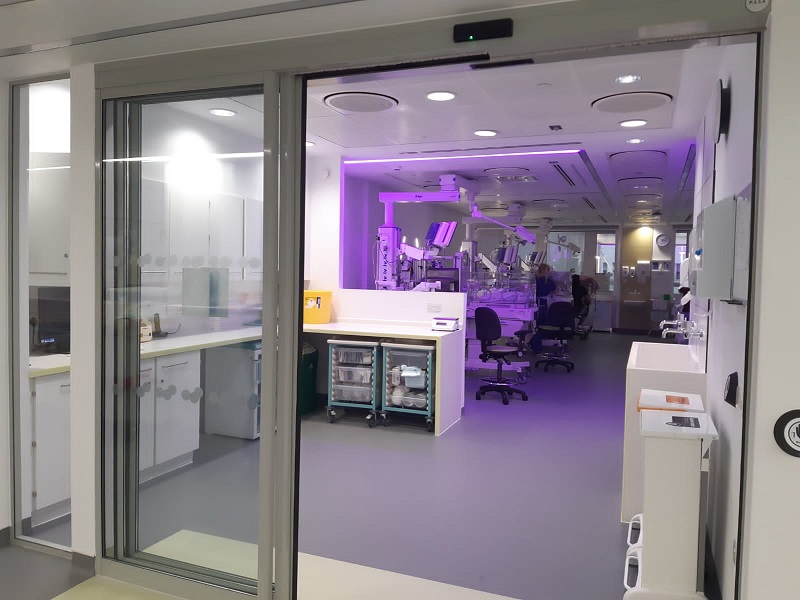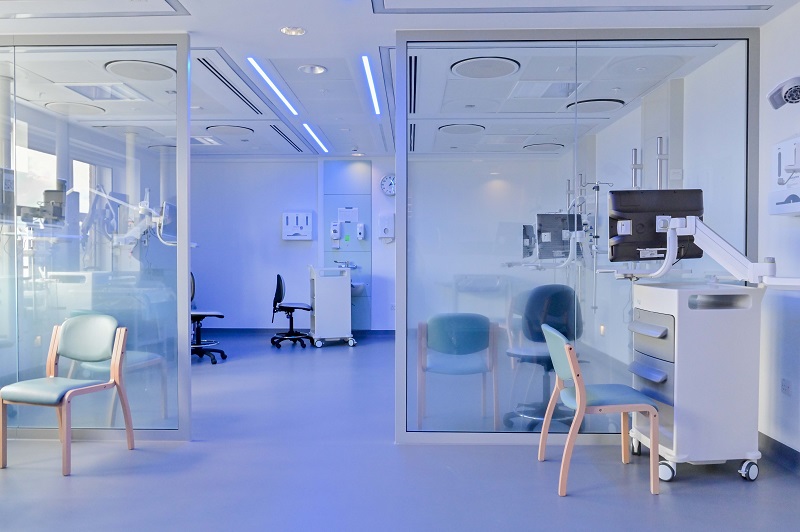Chelsea and Westminster Hospital NHS Foundation Trust and its charity, CW+, have unveiled expanded and redeveloped adult and neonatal intensive care units at Chelsea and Westminster Hospital.
The first phase of the adult ICU, named after Julia and Hans Rausing, who helped to fund the facility, was fast-tracked to open in March 2020 in order to treat the growing number of critically-ill patients admitted as a result of the COVID-19 outbreak.
And, with all construction phases now complete, the capacity of the new ICU unit has increased by 45%, allowing the trust to care for an additional 500 patients a year.
The neonatal intensive care unit (NICU) – named after donor, The Khoo Teck Puat UK Foundation – has expanded by 40%, providing specialist care to 150 more babies a year, as well as providing better clinical space and family facilities.
The new unit aims to create an optimal healing environment and incorporates the latest innovations and digital solutions that can be personalised to reduce anxiety, pain, and stress.
The design, by Ryder Architecture, is based on extensive research with the acoustics, lighting, layout, and furnishing all selected to enable patients’ brains, bodies and senses to rest and heal more effectively.
The new ICU has already played such an important role in helping to deal with the pressures of COVID-19, and the expansion reinforces the hospital’s reputation as a centre of excellence and innovation
The patient-focused environment includes, for example, media screens to enable engagement with the hospital’s arts in health programme and contact with family and friends, noise-reducing equipment, and the latest sensor technology to monitor patients’ health, progress, and environment.
The NICU has expanded to increase, not only the number of cots, but also to provide additional space and privacy around each bed space – so staff can treat babies with their parents close by, while also reducing the risk of infection, to which premature babies are particularly vulnerable.
Designed to offer a ‘home from home’ environment, it is equipped with the latest technology to facilitate improved healing conditions for the babies, including adaptive circadian rhythm lighting, which matches the needs of human biological cycles and can be individualised for each baby.
Lesley Watts, chief executive of Chelsea and Westminster Hospital NHS Foundation Trust, said: “This is a really-proud moment for our trust and a huge achievement, especially during these challenging times.

The units were designed by Ryder Architecture
“So many people have been involved in the redevelopment and I can’t thank our staff, partners, CW+ and incredible donors enough for helping create this pioneering, modern, and patient-centred critical care service in the UK.”
“The new ICU has already played such an important role in helping to deal with the pressures of COVID-19, and the expansion reinforces the hospital’s reputation as a centre of excellence and innovation.”
Chris Chaney, chief executive of CW+, adds: “We launched our £12.5m Critical Care Campaign in 2017 to help transform our ICU and NICU and are indebted to our supporters who enabled us to achieve our fundraising goal in just two years.
These new facilities bring together our core strengths in digital innovation, environment, and design, and testing and scaling the latest clinical technologies
“We are so incredibly grateful to our friends, partners, and the local community who made our shared vision to create these world class facilities come true.
“These new facilities bring together our core strengths in digital innovation, environment, and design, and testing and scaling the latest clinical technologies.
“Our ongoing research and evaluation will continue to inform the all-important work we are doing today while taking us forward into a new phase of health and care service design.
“As a charity, our ambition is to support our trust during this period of profound change across the NHS - with research, discovery and innovation remaining at the forefront of our next generation of plans to develop cutting-edge clinical services, which will include supporting the mental health of young people and the remote care of older people across our community in the year ahead.”

